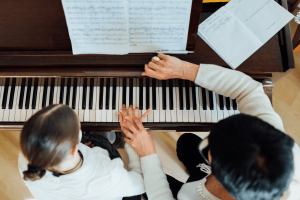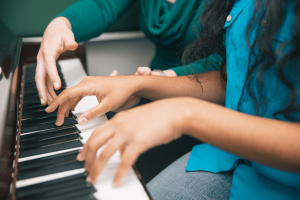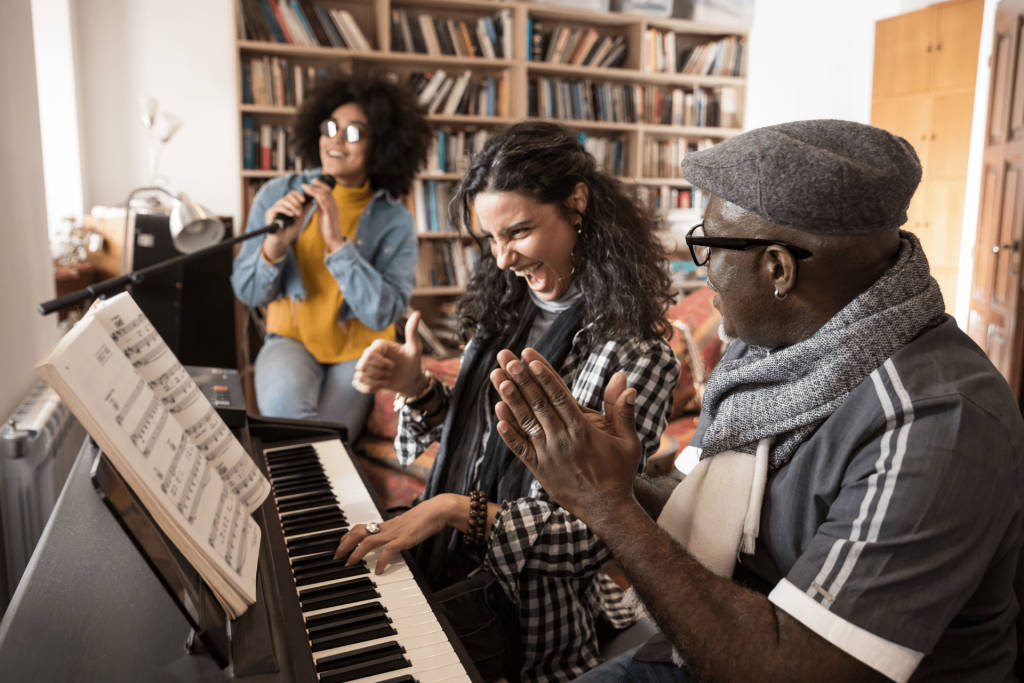Have you ever dreamt of gliding your fingers across piano keys, creating melodies that stir the soul? Whether you’re taking your first steps into music or looking to elevate your skills, piano lessons with a skilled piano instructor can make all the difference.
But how to find a piano teacher for you (or your child?) Be sure to read from top to bottom because this guide includes everything you need to know.
Should I Get A Piano Teacher Or Teach Myself?
The question you’re really asking here is, “How seriously do I want to take my training?” When it comes to learning a new skill, sure—you can watch YouTube videos to learn a few basics. That might work for you if you’re just dabbling with the piano.
But if you’re a serious piano student dreaming of mastering this musical instrument, you’ll need an experienced piano teacher.

Benefits Of Having A Piano Teacher
A piano teacher offers more than just instruction. Here are a few benefits of investing in a proper piano instructor.
They’ll help set realistic learning goals.
Is it realistic to expect you (or your child) to become Beethoven overnight? Nope! If you try to learn piano alone, you might feel disappointed by slow progress.
A piano teacher knows better, though. Professional instructors are trained to help you achieve realistic musical goals when you meet over the course of several private lessons. Whether you aim to master a complex classical piece or want to play your favorite songs more fluently, a teacher can outline a clear, achievable path.
They’ll improve your technique.
Back straight, wrists up, fingers curled! If you’re just learning the piano, how are you supposed to know whether your technique needs improvement?

A teacher’s keen eye can spot nuances in your technique that you might overlook, helping to prevent strain or injury. From posture to finger positioning, they provide hands-on guidance to correct bad habits and promote efficient playing.
They’ll help you understand musical theory.
Rhythm, dissonance, tonal systems, scales…it can all be a bit overwhelming to wrap your brain around at first. But, understanding musical theory is vital for any serious pianist, and a teacher can demystify this aspect of music through private piano lessons.
They can guide you through reading music, understanding scales and chords, and grasping the theory behind what makes music resonate. Before you know it, you’ll level up your playing skills and deepen your appreciation of music.
They make the learning process structured and enjoyable.
The last thing you want is to feel stuck or bored while you’re learning a new instrument. Professional piano teachers bring structure to your learning process to keep you engaged. They plan lessons that progressively build your skills, ensuring a balanced approach that covers technique, theory, and expression.
Moreover, a good teacher can make learning fun and engaging. They can introduce varied repertoire, interactive exercises, and even games to keep lessons lively and exciting. This balanced blend of structure and enjoyment helps maintain motivation and enthusiasm for learning the piano.
What To Look For In A Piano Teacher
Finding the right piano teacher is more or less a Goldilocks journey. Some teachers might be too strict, some might not be challenging enough, and only once you’ve done a bit of testing will you find one that’s juuuuust right.
The ideal teacher should be skilled in piano and adept at fostering a nurturing and motivating learning environment. Look for qualities like:
- Patience
- Experience
- Good reviews
- Enthusiasm for teaching
- Ability to tailor lessons to individual learning styles
Of course, you’ll also want to consider logistical issues. You need a piano instructor located in your area so attending lessons is convenient. You’ll also want to find the right mix of expertise and budget-friendliness.
More experienced teachers may cost more, but it’s worth the investment if you can swing it.
Where To Look For Piano Teachers
Start your search locally, in music schools, community centers, or through personal recommendations. Social media and community boards can be valuable resources as well.
How To Find A Piano Teacher In 5 Steps
Once you have a list of potential teachers, it’s time to narrow down your choice to ensure they align with your musical goals and learning style.
Research the piano instructor’s qualifications and professional background.
Check their qualifications. A strong educational background in music indicates a deep understanding of the subject. Did they formally study music in college and earn a degree in music? Have they worked with more advanced students?
Also, look into their professional experience. Do they perform with an orchestra or play in a band? Active musicians or those with a history in music education often bring valuable practical insights to the table.
Check out the reviews.
Seek out reviews or testimonials from former students. This feedback can provide a glimpse into their teaching style and effectiveness. You can check Google Reviews or any other number of websites to find honest feedback from former students.
Ask a few questions.
Inquire about their teaching philosophy, methods, and experience. If you’re searching for a piano teacher for your child, then be sure to ask questions that give you an idea as to whether or not they’ll be a good fit. Consider questions like:
- “How do you handle students at different skill levels?”
- “What is your approach to teaching beginners?”
- “How would you make the lesson more engaging if your student got bored?”
- “Tell me about a time you had to shift your approach for a student.”
- “How do you handle a student who just isn’t getting it?”
See if they offer trial lessons.
Many teachers offer trial lessons. This is an excellent opportunity to experience their teaching style firsthand.
Interested in booking a trial lesson with a piano teacher at Chambers Music Studio?
Ask yourself: would you come back again?
After the trial lesson, reflect on your experience. Did you feel comfortable and motivated? Could you see yourself making progress with this teacher? Did your love and appreciation of the instrument grow?
If the answer is yes, you’ve found yourself a perfect piano teacher! If not, don’t be afraid to try out a few more lessons with someone else to help you find the perfect fit.

Frequently Asked Questions
How do I find an online piano teacher?
Search for online piano teachers on dedicated music education websites, online teaching platforms, or social media groups. Check their qualifications, read reviews, and consider trial online lessons to ensure your learning style and goals are compatible.
What is the best age to teach piano?
The best age to start learning piano is typically around 5 to 8 years old, as children at this age have developed the necessary motor skills and attention span. However, piano can be learned at any age, and adult beginners can also achieve great success.
Can I learn piano without a teacher?
Yes, you can learn piano without a teacher using online resources, books, and self-study methods. However, a teacher can provide personalized guidance, help avoid bad habits, and ensure a structured and comprehensive learning path.
How many hours a day should I practice piano?
For young beginners, 10 minutes a day is a good start. As you progress, aim for 30 minutes daily. 1 hour per day is appropriate for advanced players, and collegiate or professional players might practice 2-4 hours of practice daily. Consistency and focused practice are more important than the duration.
Book A Piano Trial Lesson Chambers Music Studio
Whether you’re a budding pianist or looking to refine your skills, our personalized approach ensures lessons that resonate with your unique style and aspirations. We offer a diverse team of experienced and enthusiastic piano teachers ready to nurture your talent.
Book your piano trial lesson now and set the stage for an extraordinary musical journey with Chambers Music Studio!







